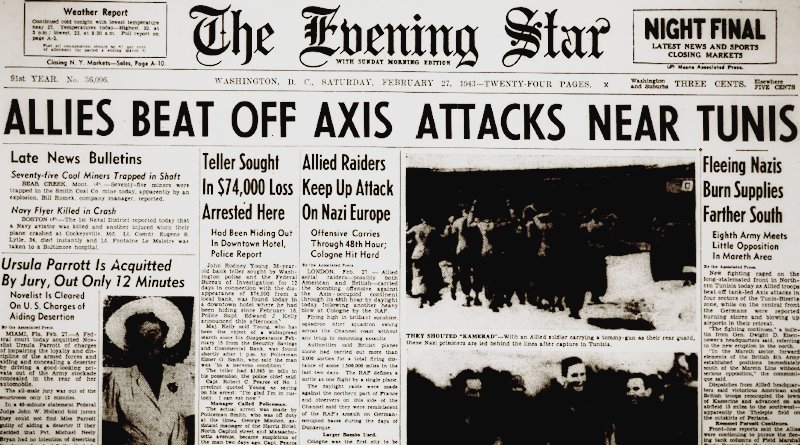World War II Chronicle: February 27, 1943
Click here for TODAY’S NEWSPAPER
George Fielding Eliot column on page eight and the sports section begins on page 11, featuring a column by Grantland Rice.
Roving Reporter by Ernie Pyle
AT THE TUNISIAN FRONT (By Wireless) — You folks at home must be disappointed at what happened to our American troops in Tunisia. So are we over here.
Our predicament is damned humiliating, as Gen. Joe Stilwell said about our getting kicked out of Burma a year ago. We’ve lost a great deal of equipment, many American lives, and valuable time and territory 00 to say nothing of face. Yet no one over here has the slightest doubt that the Germans will be thrown out of Tunisia. It is simply in the cards.
It is even possible that our defeat may not even delay Rommel’s exodus, for actually our troops formed only a small part of the total Allied forces in Tunisia. Estimates among men at the front run anywhere from two to six months for finishing the Tunisian campaign.
One thing you folks at home must realize is that this Tunisian business is mainly a British show. Our part in it is small. Consequently our defeat is not as disastrous to the whole picture as it would have been if we had been bearing the major portion of the task.
We Americans did the North African landings and got all the credit, although the British did help us. The British are doing the Tunisia job and will get the credit, though we are giving them a hand. That’s the way it has been planned all the time. That’s the way it will be carried out.
When the time comes the British First Army will squeeze on the north, the British Eighth Army will squeeze on the south, and we will hold in the middle. And it will really be the British who will run Rommel out of Tunisia.
The fundamental cause of our trouble over here lies in two things: We had too little to work with, as usual, and we underestimated Rommel’s strength and especially his audacity.
Both military men and correspondents know we were too thinly spread in our sector to hold if the Germans were really to launch a big-scale attack. Where everybody was wrong was in believing they didn’t have the stuff to do it with.
Correspondents are not now permitted to write anything critical concerning the Tunisian situation, or to tell what we think was wrong. The powers that be feel that this would be bad for “home morale.” So you just have to trust that our forces are learning to do better next time.
Personally, I feel that some such setback as this — tragic though it is for many Americans, for whom it is now too late — is not entirely a bad thing for us. It is all right to have a good opinion of yourself, but we Americans are so smug with our cockiness. We somehow feel that just because we’re Americans we can whip our weight in wildcats. And we have got it into our heads that production alone will win the war.
There are two things we must learn, and we may be learning them right now — we must spread ourselves thicker on the front lines, and we must streamline our commands for quick and positive action in emergencies.
As for our soldiers themselves, you need feel no shame nor concern about their ability. I have seen them in battle and afterwards, and there is nothing wrong with the common American soldier. His fighting spirit is good. His morale is okeh. The deeper he gets into a fight the more of a fighting man he becomes.
I’ve seen crews that have had two tanks shot out from under them but whose only thought was to get a third tank and “have another crack at them blankety-blanks.”
It is true they are not such seasoned battle veterans as the British and Germans. But they had some battle experience before this last encounter, and I don’t believe their so-called greenness was the cause of our defeat. One good man simply can’t whip two good men. That’s about the only way I know to put it. Everywhere on every front we simply have got to have more stuff before we start going forward instead of backward.
I happened to be in on the Battle of Sbeitia, where we fought the German break-through for four days before withdrawing. In the next few days I shall try to describe to you what it was like.
Evening star. (Washington, D.C.), 27 February 1943. Chronicling America: Historic American Newspapers. Lib. of Congress.
https://chroniclingamerica.loc.gov/lccn/sn83045462/1943-02-27/ed-1/
